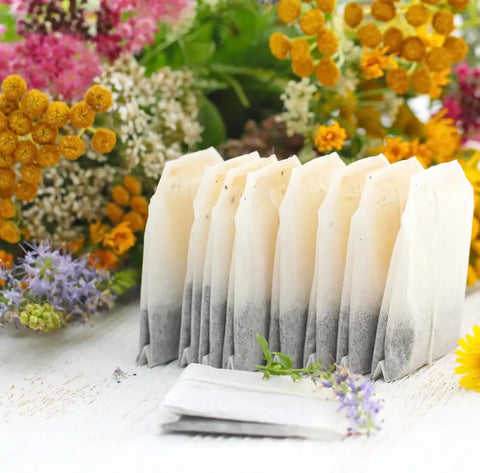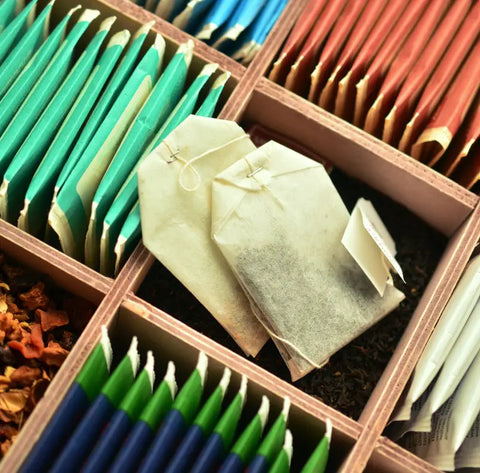The Environmental Impact of Tea Bags
Are Tea Bags Compostable? Understanding the Environmental Impact
Tea Bags
The growing popularity of tea has raised concern about the impact of tea bags on the environment. With millions of tea bags consumed daily, it's crucial to understand if they are compostable and what their effect is on our planet.
Are tea bags compostable? The answer to the question is not straightforward. In this article, we will take a closer look at the materials used in producing tea bags and their impact on the environment.

Materials Used in Tea Bag Production
Tea bags are usually sold as boxes; inside, there are many small packages. Those small packets will divide the tea into equal volumes, one pack is equivalent to one use. This tea is usually very fragrant, but when you smell it, you can realize that almost all of it is not the natural flavor of the tea leaves.
Tea bags are now trendy, and very popular. Tea is easy to use and convenient and does not take much time to prepare like other teas.
Tea bags are made of small pouches filled with tea leaves. The tea in the bag is dried by heat, then crushed and put into the tea bag packing machine to pack in the form of filter paper. When brewing, we just add hot water to have a cup of tea immediately.
However, are tea bags compostable? This question arises due to the materials used to make these pouches can significantly impact the environment.
Traditionally, tea bags are made of paper, but they often contain small amounts of plastic to keep the tea leaves collected and prevent them from spilling or getting wet. This plastic layer makes it harder for traditional tea bags to decompose in compost piles, causing concern about their environmental impact.

Impact of Traditional Tea Bags on the Environment
"Are tea bags compostable?" is an important question to ask. Researchers from McGill University in Canada carried out an experiment that placed different tea bags on the market in separate cups of boiling water. They found that on average, each bag released more than 11.6 billion microplastics and more than 3.1 billion other smaller nanoparticles. With such microplastics, the time it takes for a tea bag to decompose is exceptionally long.
The disposal of traditional tea bags can take years to decompose and release harmful chemicals into soil and water, causing soil and water pollution, harm to wildlife, and contributing to the overall impact of tea production. Traditional tea bags also require vast amounts of energy, water, and resources, leading to their environmental impact.
Moreover, the paper used for traditional tea bags is often sourced from unsustainable practices, resulting in deforestation and habitat loss for wildlife.
The bleaching process used to make the paper white also releases harmful chemicals into the environment. In other words, using tea bags is already a form of paper waste.
Biodegradable Tea Bags: A Greener Choice
The question "Are tea bags compostable?" can now be answered with a resounding yes with the introduction of biodegradable tea bags. To address these concerns, some companies are now producing tea bags made from materials such as cornmeal or fiber from the banana plant. These tea bags are fully compostable and break down much faster than traditional tea bags, reducing their environmental impact.
Besides that, cloth tea bags have also been produced and widely used by tea lovers. The use of cloth tea bags can be reused many times, thus, reducing the littering of non-biodegradable waste into the environment of traditional tea bags.
However, it's crucial to note that not all regions may have access to biodegradable tea bags, and finding eco-friendly brands can be challenging. As a result, consumers play a crucial role in reducing the environmental impact of tea consumption by choosing eco-friendly tea bags made of biodegradable materials.

Making a Sustainable Choice - Tips for Tea Lovers
When looking for a greener option for your morning tea, it's crucial to do your research. Look for tea bags made of biodegradable materials and ensure that the answer to "Are tea bags compostable?" is positive, properly dispose of used tea bags, and consider switching to loose-leaf tea or using a reusable tea filter to reduce your impact further.
Brewing tea bags can also help reduce your environmental impact and improve soil health. Tea bags contain organic matter that can provide nutrients to the soil and retain moisture. By brewing tea bags, you can reduce waste and help create a healthier environment.
Moreover, consider switching to loose-leaf tea or using a reusable tea filter and supporting eco-friendly tea brands. This will help to maintain sustainability and environmentally-friendly practices in their tea production process.
Conclusion
So, are tea bags compostable? It is a complex issue that depends on the materials used in their production. While traditional tea bags can take years to decompose and release harmful chemicals into the environment, biodegradable tea bags offer a more sustainable alternative. By making informed choices and promoting sustainability in tea production, consumers can help reduce the environmental impact of their tea consumption.





Leave a comment